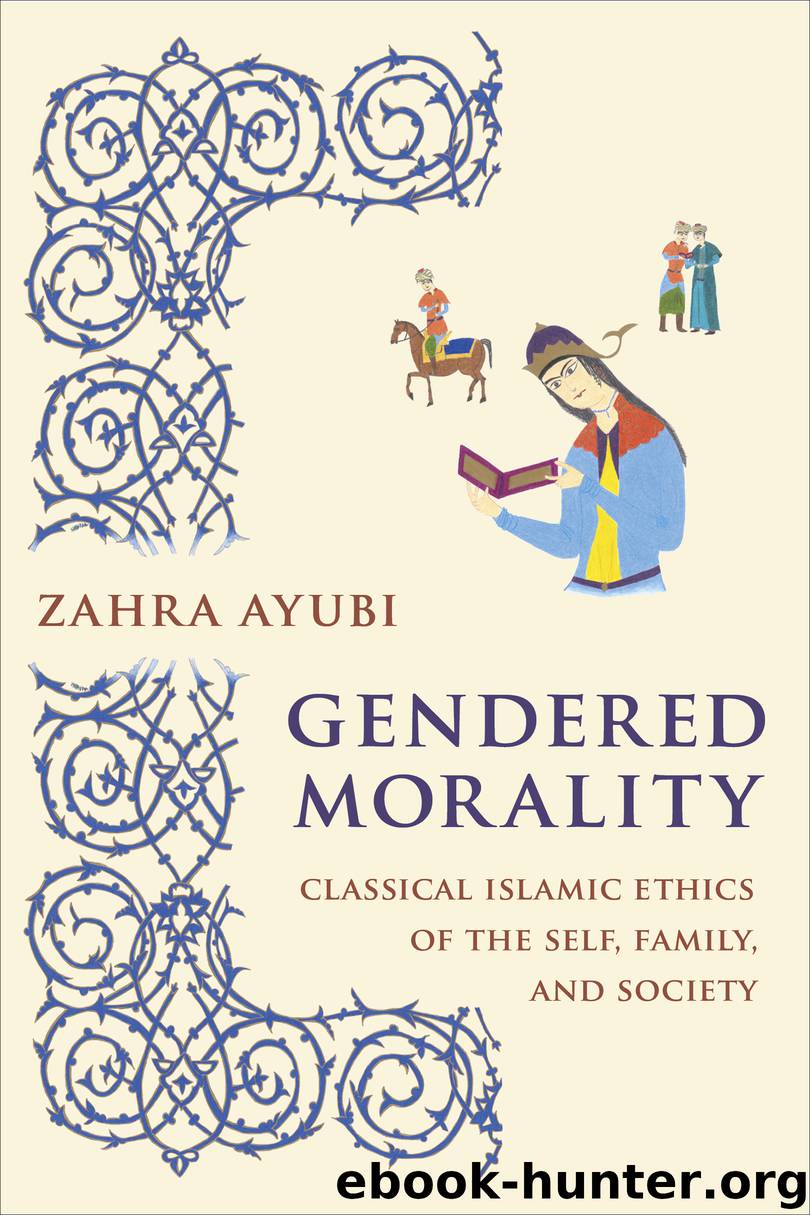Gendered Morality by Ayubi Zahra M. S.;

Author:Ayubi, Zahra M. S.;
Language: eng
Format: epub
Publisher: Lightning Source Inc. (Tier 3)
CHAPTER FOUR
Homosocial Masculinity and Societal Ethics
The universe is male.
—Aisha Tabriz
There it is, then, before our eyes, the procession of the sons of educated men, ascending those pulpits, mounting those steps, passing in and out of those doors, preaching, teaching, administering justice.
—VIRGINIA WOOLF
In the Ghazali-Tusi-Davani ethics tradition, a man becomes fully ethical through association with other human beings in the public sphere. Only by interacting with and relating to a range of friends, acquaintances, colleagues, servants, and superiors—all of whom are imagined as male—can a man understand his place in society’s hierarchy of power and in the cosmos. The ethicists describe male responsibility at both the microcosmic and the macrocosmic levels using a single term, governance (siyasat), which connotes coercive ordering of not only the ethics of household management and domesticity, but also the ethics of how to live among and treat a group of male individuals within a community, city, or the world at large. This third level of siyasat, after individual and domestic governance, deals with friendship, community, society, and sovereignty. A man must master this level of governance in order to thoroughly dispense his ethical responsibilities. Tusi explains the relationship between the individual man and society as follows: “Just as each person is a part of the household, so each household is a part of the locale, each locale is a part of the city, each city is a part of the nation, and each nation is a part of the inhabitants of the world.”1 Within this nested cosmos, each man, as a microcosm unto himself, can achieve a perfected nafs only once he is ethical on all the scales of human existence.
In the previous chapter, I considered how the texts present ethical masculinity in the domestic realm by analyzing their discussions of husband-father and wife-mother roles and their occasional contrasts between masculinity and femininity. In this chapter, I broaden my analysis to the public sphere, uncovering how Ghazali, Tusi, and Davani construct masculinity and men’s ethical relations with one another in the context of society, specifically the urban homosocial environment. Several questions drive this inquiry: What are the ideal kinds of masculinity for men interacting with one another in society? Is there a possibility for social and intellectual mobility? What are the elements that make social behavior ethical? Which men are excluded from ethical refinement, and why? From this inquiry, the picture of the ethical man that emerges is of one who is mindful of his surroundings and elite station in society, responsible for himself and his friends and family, and careful with his words and actions. Overall, the ethics texts define ultimate masculinity in terms of elite power, intellectual hierarchy, and ethical comportment within the homosocial structures of community, civic, and court life. Occasionally, they also define this public masculinity in contrast to women’s behavior.
As I explore Ghazali’s, Tusi’s, and Davani’s ethical precepts for the all-male urban homosocial environment—where superiors, equals, subordinates, friends, and foes are all hierarchically ranked by their intellectual abilities and ethical refinement—I
Download
This site does not store any files on its server. We only index and link to content provided by other sites. Please contact the content providers to delete copyright contents if any and email us, we'll remove relevant links or contents immediately.
| Hadith | History |
| Law | Mecca |
| Muhammed | Quran |
| Rituals & Practice | Shi'ism |
| Sufism | Sunnism |
| Theology | Women in Islam |
The History of Jihad: From Muhammad to ISIS by Spencer Robert(2216)
Nine Parts of Desire by Geraldine Brooks(2014)
The Turkish Psychedelic Explosion by Daniel Spicer(2000)
The First Muslim The Story of Muhammad by Lesley Hazleton(1891)
The Essential Rumi by Coleman Barks(1642)
The Last Mughal by William Dalrymple(1575)
Trickster Travels: A Sixteenth-Century Muslim Between Worlds by Davis Natalie Zemon(1548)
1453 by Roger Crowley(1514)
by Christianity & Islam(1354)
God by Aslan Reza(1339)
Muhammad: His Life Based on the Earliest Sources by Martin Lings(1310)
A Concise History of Sunnis and Shi'is by John McHugo(1280)
Magic and Divination in Early Islam by Emilie Savage-Smith;(1207)
The Flight of the Intellectuals by Berman Paul(1187)
No God But God by Reza Aslan(1166)
Art of Betrayal by Gordon Corera(1136)
What the Qur'an Meant by Garry Wills(1124)
Getting Jesus Right: How Muslims Get Jesus and Islam Wrong by James A Beverley & Craig A Evans(1083)
The Third Choice: Islam, Dhimmitude and Freedom by Durie Mark & Ye'or Bat & Bat Ye'or(1071)
